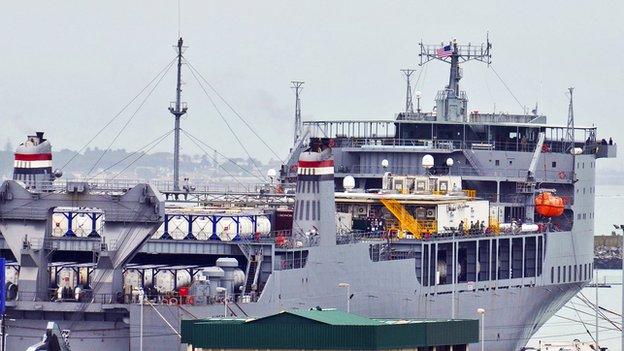UK site ready to destroy chemical weapons
- Published
- comments
David Shukman at the plant: ''A fiery end to chemicals that could have become weapons''
Preparations are under way in Britain to destroy key components of Syria's chemical weapons arsenal.
A waste handling site in Ellesmere Port is on standby to receive 150 tonnes of chemicals from Damascus.
The facility, run by French-owned Veolia Environmental Services, plans to incinerate so-called precursors.
Precursors are the ingredients needed to make weapons such as the nerve agent VX.
This comes amid mounting international concern that Syria is dragging its feet over a promise to get rid of its chemical stockpile.
Only four consignments have left Syria so far - the latest came yesterday when 30 tonnes of mustard gas were handed over.
Mustard gas is a weapon that became notorious in the First World War.
But under an international deal brokered last year, Syria was due to have exported over 1,300 tonnes of chemicals by a deadline that passed earlier this month.
So far only about 13% of that stockpile has been shipped out, according to the body supervising the operation, the Organisation for the Prohibition of Chemical Weapons (OPCW).
Many deaths
The deal followed outrage over the killing of hundreds of civilians in the outskirts of Damascus suburb after the firing of rockets filled with Sarin.
The chemicals due to be delivered to Britain will come in solid and liquid form and are both from the chloro-amine family.
They are known as "B" precursors and have to be combined with "A" precursors to become chemical weapons - none of the latter will be coming to Britain.
If they were to be mixed, the result would be the creation of nerve agents such as VX, the deadliest of all chemical weapons.
For safety, the OPCW is keeping the two types of precursors separate and has planned to have them destroyed at different locations.
At the Veolia site, the precursor chemicals will be fed into the company's incinerator where they will be burned at a temperature of 1,150C.
David Lusher, the company's UK executive director, told me: "Ironically if the material were to be in the back of any factory in any UK facility it would genuinely represent standard industrial chemicals.
"They are standard industrial chemicals - we accept similar materials to this site today, yesterday, last week, last year - we accept a lot of materials from the chemical sectors and agrochemical sectors and petrochemical sectors - this is what this site is here for."
Locals worried
When news of the plan emerged, it provoked a nervous reaction among local people with some calling for the shipments to be halted.
The government and Veolia have had to offer reassurances about the chemicals involved and that the site is well used to handling far more hazardous substances.
The local MP, Andrew Miller, said: "It would have been utterly irresponsible to have run a scare story - this site has 22 years of operation at the highest standards."
Under the plan drawn by the OPCW and UN, and originally agreed by Syria, the task of destroying the chemical weapons should have been well under way by now.
Instead, delays mean that the remaining stockpile will have to be shipped very shortly if the 30 June deadline for the chemicals' destruction is to have any chance of being met.
According to a former commander of a British unit specializing in chemical and biological weapons, the shipping of the mustard gas yesterday raises a question about the point of the $100m disposal operation.
Hamish de Bretton Gordon, who now runs a consultancy, SecureBio, said: "If all the mustard gas is out, and the machinery to mix and make chemical weapons has been destroyed - and that's been verified - and the aim was to prevent chemical weapons killing any more people, is it worth continuing?
He advocates destroying the chemicals in Syria, as has happened with one batch of components already.
According to UK government sources, the destruction plan agreed with Syria allowed for the extra time needed because of the conflict.
Yesterday's consignment of mustard gas has been welcomed as an important step but officials say the vast bulk of the stockpile still has to be shipped.
- Published2 July 2014
